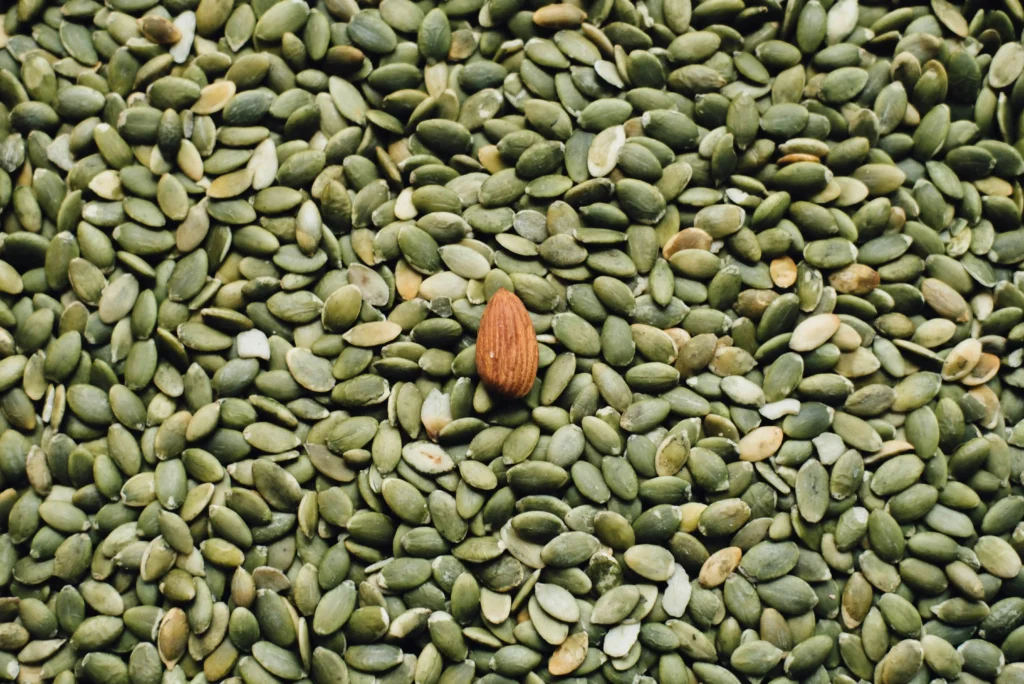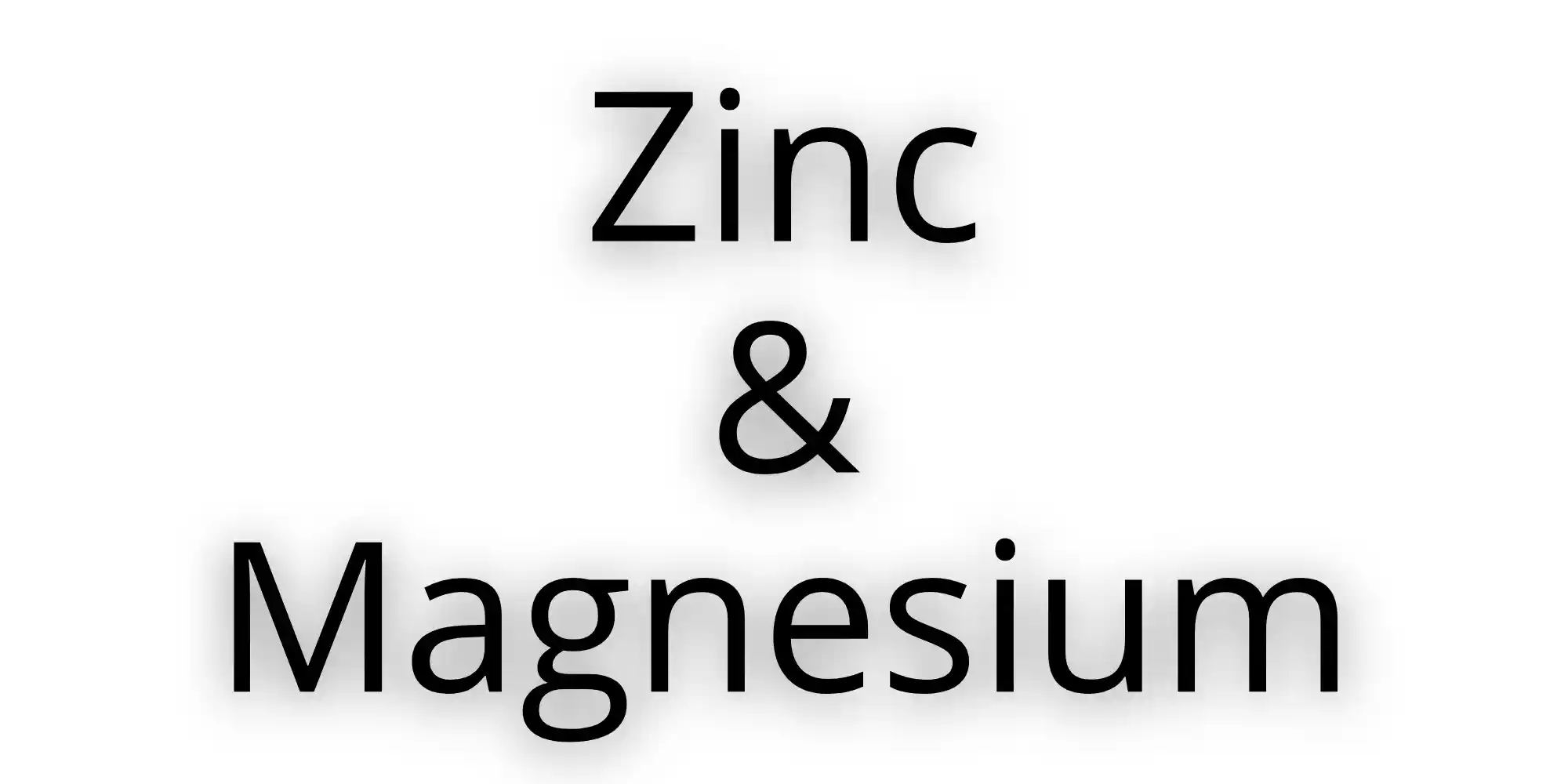Disclaimer: This content is for informational purposes only and should not replace professional medical advice.
The Mineral Combo
Zinc and magnesium for men are more than just supplement buzzwords — they’re essential tools your body depends on, whether you realize it or not.
There’s a classic male trifecta: crappy sleep, chronic stress, and “I’ll start taking care of myself on Monday.” The problem? Monday never shows up, and your body starts charging interest. Among the nutrients that quietly suffer the most in this modern chaos, two minerals stand out: zinc and magnesium.
These two are the unsung heroes of male health. If they were people, they’d be that low-key friend who never asks for much but somehow always saves your ass when things go sideways.

Why Zinc and Magnesium Matter (A Lot)
The Role of Zinc
Zinc is involved in over 300 enzymatic reactions in your body. That’s not a typo.
- It’s critical for immune function, wound healing, and even your sense of smell (yes, your steak smells amazing because of zinc).
- It helps metabolize proteins, carbs, and fats.
- And most importantly for the alpha-minded: it plays a direct role in testosterone production.
The Role of Magnesium
Magnesium is a biochemical overachiever — it’s involved in 600+ enzymatic processes, including:
- Muscle and nerve function
- Heart rhythm and blood pressure regulation
- ATP production (your body’s energy currency)
- And yep — it’s linked to testosterone levels, especially in men who train hard.
👉 Bottom line: Without zinc and magnesium, you burn out faster, recover slower, and your hormones start playing for the other team.
Zinc, Magnesium, and Testosterone: Hype or Real?
Here’s the no-BS truth: if you’re deficient in zinc or magnesium, supplementing can increase testosterone levels.
- Young men with low zinc saw significant boosts in testosterone after taking 30 mg/day.
- Athletes supplementing 250–400 mg of magnesium per day saw elevated testosterone levels and improved performance.
But — and there’s always a “but” — if your levels are already normal, mega-dosing won’t turn you into Thor. The body doesn’t run on “more is better.” It just dumps the extra — or worse, throws a side effect party.
Food vs. Supplements: How Should You Get Them?
From Food (The Ancestral Way — Works Like a Charm)
- The body absorbs nutrients better from whole food sources.
- It’s hard to overdose just by eating real food.
- You get bonus nutrients like fiber, antioxidants, and co-factors.
From Supplements (The Modern Shortcut)
- Useful for real deficiencies or high physical demand.
- Practical if you’re training hard and your diet isn’t cutting it.
- But comes with risks: diarrhea (magnesium), copper depletion (zinc), even anemia.
👉 Moral of the story: Supplements are like a toolbox — useful when needed, but not your daily furniture.
Quick Reference Table: Where to Find Zinc and Magnesium in Food
Here’s a practical breakdown of mineral-rich foods:
| Level | Food (average portion) | Zinc (mg) | Magnesium (mg) | Notes |
|---|---|---|---|---|
| 🔝 Very High | Oysters (3.5 oz / 100g) | 16–25 | 60 | Zinc king. Also, suspiciously considered an aphrodisiac. |
| 🔝 Very High | Pumpkin seeds (1 oz / 30g) | 2.9 | 150 | The official snack of men who read labels. |
| High | Beef (3.5 oz / 100g) | 5–7 | 20 | Strong zinc, modest magnesium. |
| High | Brazil nuts (0.7 oz / 20g) | 1.2 | 100 | Magnesium-loaded, decent zinc, bonus: selenium. |
| Medium | Raw spinach (1 cup / 30g) | 0.2 | 24 | Magnesium’s decent, zinc’s barely invited. |
| Medium | Almonds (1 oz / 30g) | 0.9 | 80 | The natural multivitamin of fitness bros. |
| Medium | Beans (3.5 oz / 100g) | 1.0 | 40 | Decent, but phytates mess with absorption. |
| Low | Boiled egg (1 large) | 0.6 | 10 | A helper, not a hero. |
| Low | Starfruit (3.5 oz / 100g) | 0.1 | 10 | More vitamin C than minerals. |

How Much Do You Actually Need?
Zinc
- Daily requirement (adult male): 11 mg
- Upper safe limit: 40 mg/day
- Absorption: Only 20–40% of what you consume is absorbed
Magnesium
- Daily requirement: 400–420 mg
- Supplement limit: 350 mg/day
- From food: no overdose risk — worst case, you become “that guy” who always knows where the nearest bathroom is.

The Dark Side: When “More” Becomes a Problem
Let’s get one thing clear — you can absolutely overdo it. And when you do, your body lets you know in ways that aren’t subtle.
Zinc Overdose
Too much zinc doesn’t make you stronger — it actually weakens you.
- Blocks copper absorption, which is essential for red blood cell production and nervous system function.
- Can cause anemia, low immunity, nausea, and even hair loss.
- Ironically, you might take zinc for “vitality” and end up feeling like you’ve been hit by a truck.
Symptoms of excess zinc:
- Nausea
- Abdominal pain
- Fatigue
- Decreased physical performance
- Hair thinning
Magnesium Overdose
From food? Not a problem. From supplements? Definitely a maybe.
- Too much = diarrhea (magnesium citrate, we’re looking at you).
- Can cause cramping, low blood pressure, and in people with kidney issues — cardiac complications.
- Reminder: supplements don’t come with a warning siren. You have to know your dose.
Copper Deficiency (Thanks to Too Much Zinc)
This one’s sneaky and commonly missed, even by doctors.
Symptoms:
- Premature gray hair
- Weak nails
- Numbness or tingling in limbs
- Anemia — even when your iron levels look “normal”
Translation: You think you’re optimizing your testosterone… but really you’re torpedoing your whole system. Smooth move, zinc bro.
A Smart Strategy (Without Turning Into a Supplement Zombie)
You don’t need to become neurotic. You just need to be consistent.
Here’s how to play it smart:
- Eat a diverse diet: lean meats, seeds, nuts, greens — it adds up.
- Supplement only when necessary: if bloodwork shows you’re low, or your diet is chronically lacking.
- Pair with Vitamin C: boosts zinc and iron absorption from plant sources.
- Safe supplement zone:
- Zinc: 10–20 mg/day
- Magnesium: up to 500 mg/day (total from food + supplement)
If you’re training hard, sleeping poorly, or stressed out like the rest of modern humanity, a mild supplement could help. But more doesn’t mean better. It means bloated, broke, and sitting on the toilet wondering where it all went wrong.

Testo Talk: Minerals Alone Won’t Make You a Beast
Let’s rip the Band-Aid: no amount of zinc or magnesium will fix a broken lifestyle.
Want to support testosterone naturally?
- Sleep 7–9 hours (yes, really)
- Train heavy, regularly
- Get sunlight (vitamin D is part of the hormonal equation)
- Reduce chronic stress (aka stop watching the news before bed)
Zinc and magnesium are your backup crew — not the main act.
Want to know what actually drives testosterone up? Check out our full guide — the real testosterone boosters.
The Moral of the Story:
Zinc and magnesium are like that buddy who helps you move apartments: unglamorous, underappreciated — but absolutely essential.
They’re not “masculinity magic pills,” but keeping your levels solid leads to better:
- Energy
- Immune function
- Mood
- Testosterone production
The trick isn’t swallowing pills until you rattle — it’s balance.
- Don’t over-supplement — or you’ll end up with copper deficiency, digestive problems, and some weird Google searches.
- Don’t eat like trash — or you’ll run low on key nutrients.
- Hit the right range — and congrats, you’re in the top 1% of men who actually understand how their body works.
If this post saved you time, money, or prevented questionable life choices… you can tip below.
This article is for informational purposes only and is not a substitute for professional medical advice, diagnosis, or treatment. Always consult a qualified healthcare provider before making any decisions about your health or starting a new regimen.
Photos by Unsplash

